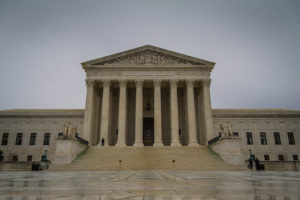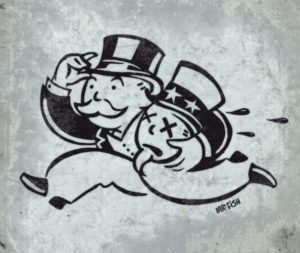Truthdigger of the Week: Sheila Bair
Few voices in the regulatory community called for the expulsion of derelict executives and the means to force banks to lend bailout money to the public amid the 2008 financial crisis. Former FDIC Chairman Sheila Bair was among them.Few voices in the regulatory community called for the expulsion of derelict executives and the means to force banks to lend bailout money to the public.
Few voices in the regulatory community called for the expulsion of derelict executives and the means to force banks to lend bailout money to the public amid the 2008 financial crisis. Former FDIC Chairman Sheila Bair was among them.
Bair, a Republican, joined the Washington, D.C., staff of then-Sen. Bob Dole, R-Kan., in 1981. Within a decade she was overseeing the derivatives market under Presidents George H.W. Bush and Bill Clinton as part of the Commodity Futures Trading Commission, and served as head of the FDIC under Presidents George W. Bush and Barack Obama. Her new book, “Bull by the Horns,” is an account of the Bush and Obama administrations’ response to the 2008 meltdown.
As leader of the FDIC during that period, Bair was witness to the efforts that Treasury Secretaries Hank Paulson and Timothy Geithner made to save the individuals and banks that were most responsible for the crisis, while leaving American homeowners and taxpayers high and dry. The New York Times’ Gretchen Morgenson, who hailed Bair’s book as an “important piece of history and a rebuttal to the conventional wisdom,“ offered a sample from it:
[P]erhaps the most telling anecdote is from early October 2008, when Henry M. Paulson Jr., the Treasury secretary, summoned Ms. Bair to his office. No reason was given for the meeting. When she arrived, Ben S. Bernanke, the Federal Reserve chairman, was already there. Timothy F. Geithner, then the president of the New York Fed, was on the phone.
Handed a piece of paper, Ms. Bair saw that she had been ambushed. It was a script, prepared for her by the Treasury and the Fed, stating that the F.D.I.C. was moving to guarantee all the liabilities in the financial system. Astonishingly, the guarantee would cover all bank depositors and even protect unsecured claims against institutions. In short, the F.D.I.C. was being asked to back ‘everybody against everything in the $13 trillion banking system,’ Ms. Bair writes.
Taking seriously her job to serve the American public, Bair rejected the plan to drive the FDIC’s funds directly into the pockets of everyone who held bank debts, a modest victory considering that Geithner and company eventually succeeded in handing over trillions of dollars at low interest to institutions that then refused to pump them back into the economy in the form of loans. “Workers, homeowners [and] small businesses have by and large been left to fend for themselves” amid bailouts for “too big to fail” institutions, Bair said in an interview with Morgenson.
Bair failed to bring about regulation that held the executives of those banks responsible. Citigroup CEO Vikram Pandit, whom she lobbied to have fired for failing to reform the bank’s investment and lending practices, remains chief of his company. The bailed out banks continue to sit on the cash they were given to get the American economy started again, and Bair’s former colleagues in the regulatory community on the whole continue to go easy on the corporations that the American people trust them to govern.
For her attempts to defend the public against her negligent and exploitative peers, and for enlarging our understanding of what was and continues to be a crucial time in American history, we honor Sheila Bair as our Truthdigger of the Week.
— Posted by Alexander Reed Kelly.
Your support matters…Independent journalism is under threat and overshadowed by heavily funded mainstream media.
You can help level the playing field. Become a member.
Your tax-deductible contribution keeps us digging beneath the headlines to give you thought-provoking, investigative reporting and analysis that unearths what's really happening- without compromise.
Give today to support our courageous, independent journalists.






You need to be a supporter to comment.
There are currently no responses to this article.
Be the first to respond.